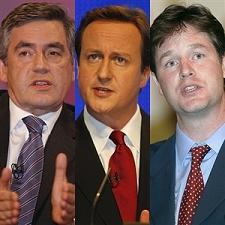Britain’s Election: Welcome to No Choice Democracy

British voters go to the polls on Thursday in a general election that promises to be historic – for all the wrong reasons.
Firstly, voter turnout threatens to hit a post-Second World War record low. Over the past six decades, the percentage of eligible Britons casting their vote has steadily fallen from 80-70 per cent to around 60 per cent. With public apathy and antipathy towards the three main political parties – the incumbent Labour government, the Conservatives and the Liberal Democrats – running at all-time highs, there is a real prospect that the British general election of 2010 will see as many citizens forfeiting their democratic right as those turning out to vote.
Part of the collapse in democratic participation in Britain (as elsewhere) is due to growing public realization that the main parties are “out of touch” in terms of putting forward solutions to address the severe problems facing British society: mounting social misery, unemployment, poverty and debt, both individually and nationally. The budget deficit is estimated to be around £163 billion, which, some commentators say, puts Britain on a par with Greece in terms of its gravity.
This brings us to the second most notable characteristic of the 2010 British election: there is now patently no political choice on offer to voters. The putative essence of western-style parliamentary democracy is that “the people” exercise a choice in selecting a political party based on manifestos of differing ideas and policies.
From 1945-97, there was at least the semblance that the British Labour Party in particular represented the interests of the working and lower middle classes. But under the “reforming” leadership of Tony Blair and his successor, Gordon Brown, “New Labour” has become indistinguishable from the other main parties in terms of slavishly fawning over big business and the wealthy elite. Prior to the 1997 election, which brought Labour to government, one senior Conservative smugly noted that, in terms of economic policy, there was “not a cigarette paper between” the Thatcherite Tory Party and Blair’s New Labour.
That election, by the way, marked the post-Second World War slump in British voter participation, which now looks set to slump even further.
The facts on the ground tend to corroborate this morphing of British politics into a mainstream mulch of nothingness for ordinary people. The gap between rich and poor has widened over the past 13 years of Labour government, even surpassing the notoriously pro-wealthy previous 19 years of Conservative government. A recent Rich List compiled by the British Sunday Times found that Britain’s 1,000 super-rich saw their wealth increase by one-third – or £77 billion – to a total £334 billion during 2009 alone. Evidently, the only thing that a large chunk Labour Prime Minister Gordon Brown’s £1,000 billion stimulus package achieved was stimulating the assets of the already wealthy.
All three main political parties have said that economic austerity is the necessary tough medicine to cure Britain’s sick fiscal condition. Despite the outrageous aggrandizement of wealth by a tiny elite, the wider public is being told that they will have to pay for the economic crisis through higher taxes and massive cuts in public services.
In an advertently shocking admission of the stranglehold on Britain’s politics, a Financial Times (26 April) front page headline read: “Brutal choices over British deficit”. Its report went on to say: “The next government will have to cut public sector pay, freeze benefits, slash jobs, abolish a range of welfare entitlements and take the axe to programmes such as school building and road maintenance.” In other words: you can vote, but it won’t make a difference – this is how the economy is going to be run as dictated by capital.
Ruled out from the outset, it seems, are imminently sensible and workable options, such as taxing the super-rich whose combined wealth is more than twice than of Britain’s budget deficit, or immediately ending budget-draining criminal wars of foreign occupation.
This “no choice democracy” is being foisted on ordinary people everywhere, from North America to Europe. It is the other side of the prescription of “economic structural adjustment” that for decades was the “tough medicine” that international capital forced poverty-stricken nations to swallow. The “choice” it seems is: you can hold your nose while swallowing this, or you may not hold your nose. The British non-election of 2010 marks the nadir in western so-called liberal democracy in which “we the people” have pointedly no choice in how our societies are to be run. Because we are all Third Worlders now. Bankrupt politics in hand with bankrupt economics.
One indirect benefit, however, could the widening realization among ordinary people – whether in Britain, the US, Greece, Spain, Portugal, Ireland, Latvia etc – that a solution to the crisis in the capitalist political economy cannot be found in the present dead-end framework of mainstream parties.
Finian Cunningham is a journalist and musician www.myspace.com/finiancunninghammusic

